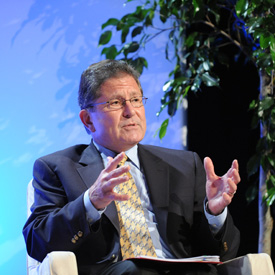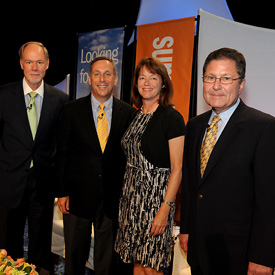
Credit: Sean Sime
Rutgers President Richard L. McCormick speaking at the CASE Summit 2010.
These were among the themes of a panel discussion of leading university presidents that kicked off the CASE Summit 2010, an annual conference of the Council for Advancement and Support of Education.
Richard L. McCormick, president of Rutgers University; Lawrence S. Bacow, president of Tufts University; and Alice P. Gast, president of Lehigh University, assessed the state of higher education (its threats, opportunities, weaknesses, and strengths) and what leaders could do to adapt and steer their institutions in the 21st century.
This year’s summit drew 700 advancement leaders from universities and colleges throughout the country to New York this week. John Lippincott, president of CASE, served as the panel’s moderator.
“My parents’ generation believed in public investment in higher education,” said Rutgers President McCormick, citing the era’s support of the GI Bill, the expansion of public campuses, the invention of community colleges, and the use of the federal government as an instrument in basic scientific research.
“That sense has waned and we’re all struggling with it,” he said.
The panelists agreed that even in a time of diminished public and private funding, the expectations of students and families for quality and excellence remain high. This may be a product of higher education’s success, they said. Opportunities for men and women of all ages, races, and ethnicities; investments in student aid; and other achievements have led to the conclusion that “we are a mature industry and can stand on our own,” McCormick said.

Credit: Sean Sime
A panel discussion at CASE Summit 2010 on Leadership in the New Decade featured, from right, Rutgers University President Richard L. McCormick; Lehigh University President Alice P. Gast; Tufts University President Lawrence S. Bacow; and was moderated by CASE President John Lippincot.
Bacow said that to adapt to societal demands in the next decade universities must rethink the way they generate revenue, pursuing funds that provide the greatest flexibility for the institution. “That means changing the conversation with donors and inviting them to help us solve problems,” he said.
“Those of us who relied upon gifts for our endowment to fund new programs [or buildings] have dug ourselves into a hole, thereby weakening our institutions. When endowments decline, the university is left with a commitment to the donor and far less resources to support it.”The Tufts president, who is stepping down next year after a 10-year tenure,
said that the cohort of faculty and administrators who will retire over the next 10 to 15 years represents a “huge opportunity” for institutions to question existing premises and arrangements, and eliminate unnecessary processes and administrative structures. Some schools tend to overinvest themselves in certain fields, such as romance languages, and many still require outmoded courses that “students don’t want to take and faculty don’t want to teach,” Backow said.
Gast talked about the importance of creating new modes of education and “value-added” experiences that students can’t get elsewhere. At Lehigh, she said, faculty help construct “integrated learning experiences.” In one program, for example, students collaborate with architects, designers, and engineers to develop plans for new campus buildings.
“There has been an important sea change in the way people learn,” she said. The focus no longer is about imparting information. “The information is out there. The role of the professor is to guide the process.”
McCormick said that providing mature adults with high quality, lifelong learning is one area that holds promise for higher education. In addition to serving the expanding population of adults enrolling in continuing education courses to enhance their work skills, Rutgers has established partnerships with several community colleges that give New Jersey residents opportunities to earn a Rutgers degree while staying close to home.
Such arrangements represent the greatest opportunity we have to address revenue shortfalls and make our institute more relevant to public pursuits, McCormick said.
CASE, an international membership association, advances and supports educational institutions by providing knowledge, standards, advocacy, and training designed to strengthen the combined efforts of alumni relations, communications, fundraising, marketing, and allied professionals.